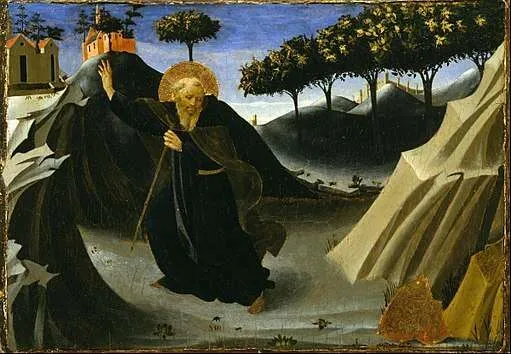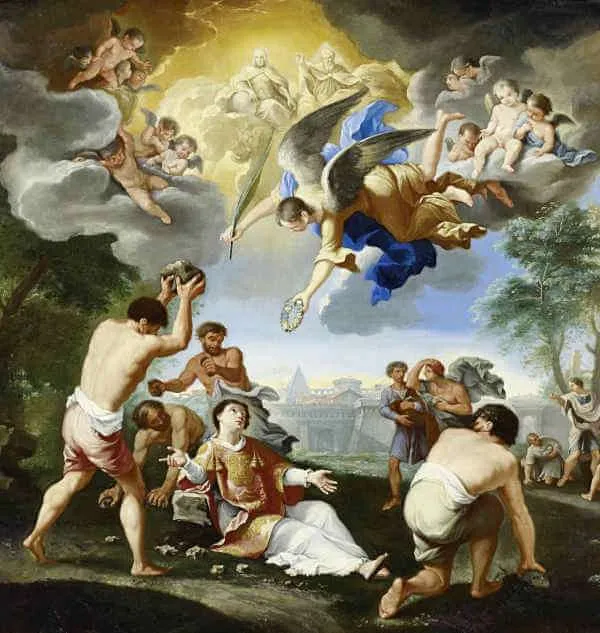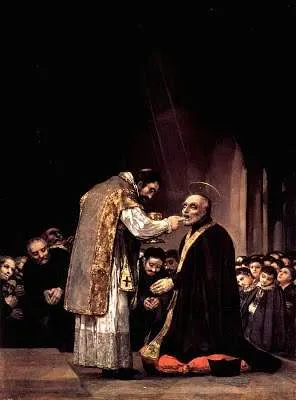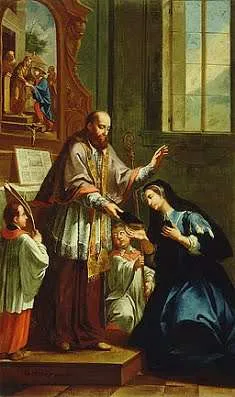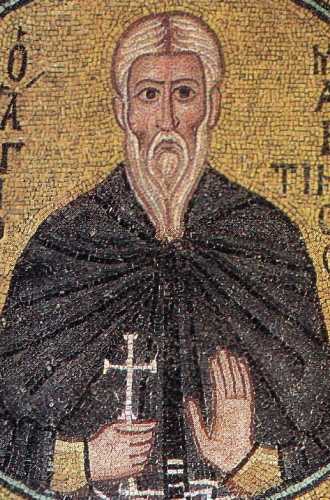Patron Saint of basketmakers, gravediggers, butchers, swineherds, motorists, amputees, monks, and farmers, Invoked against skin diseases and epilepsy, Pre-Congregation canonization
Anthony was born into an upper-class Catholic home. His parents raised Anthony and his younger sister in a small village in southern Egypt. He received a basic education and was twenty years old when his parents suddenly died. He was left with a large inheritance and the responsibility of caring for his sister. Some months later, Anthony was attending Mass and heard the Gospel story of Jesus’ command to the rich young man: “If you wish to be perfect, go, sell what you have and give to the poor, and you will have treasure in heaven” (Matthew 19:21).
As Anthony heard these words, he knew Jesus was speaking directly to him. Shortly after, he gave away most of his property, sold almost everything else, and kept only what he needed to care for himself and his sister. But that’s not exactly what the Lord had commanded! Jesus said that perfection is obtained only if one were to sell everything and give it to the poor.
Not long afterward, Anthony was at Mass once again and heard the Gospel passage, “Do not worry about tomorrow; tomorrow will take care of itself” (Matthew 6:34). Again, he knew Jesus was speaking directly to him, so he gave away even the little he had saved back, entrusted his sister to the care of some holy women, and entered the desert to live a life of poverty, solitude, prayer, and mortification.
In that harsh desert landscape, the devil attacked him in countless ways. “Think about all the good you could have done with that money you gave away!” These were the words of the evil one, trying to deter Anthony from embracing his unique vocation as a hermit. Then the devil appeared to him in physical form and sent vile creatures to frighten him. Satan tempted Anthony with boredom, laziness, and even appeared as a female temptress to seduce him. Firm in prayer and mortification, Anthony fought off the devil and his manifestations. Though beaten senseless during these spiritual battles, he recovered in the care of some friends who visited him.
After spending fifteen years living in a desert cave once used as a tomb, Anthony retreated even deeper into solitude, spending another twenty years in self-imposed solitary confinement. He ate only bread that friends threw over the wall of the abandoned Roman fort he called home. He never opened his mouth to speak to anyone, for God called him to the unique life of complete solitude.
Eventually, Anthony’s holy example stirred up devotion and admiration in the hearts of others. Though they could not speak to him, many wanted to imitate him. They began to build huts nearby and imitate his vocation. Then, after twenty years of solitude, God directed Anthony to exit his fort and assist the other nearby hermits with their vocations. For the next five years, he instructed the new hermits on how to organize their lives.
Anthony then withdrew once again into seclusion for the last forty-five years of his very long life. However, this time he did accept visitors from time to time and even entered nearby cities to occasionally preach and teach. Most notably, he preached firmly against the rampant Arian heresy, directly opposed the emperor for persecuting Christians, and fearlessly offered himself up to be martyred.
God did not grant his desire for martyrdom, however. Instead, Anthony lived to the ripe old age of 105. He made a powerful impact upon the lives of many by his radical obedience to God’s will, through his life devoted to prayer, his embrace of poverty, his courageous preaching against heresy, and his assistance to those daring to live as hermits. He was so influential that another heroic saint of that time, the bishop Saint Athanasius, wrote a biography of Saint Anthony, supplying much of what we know about him today.
Source: https://mycatholic.life/saints/saints-of-the-liturgical-year/january-17-st-antony-patriarch-of-monks/

